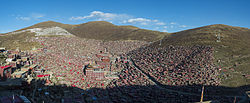Kardzé
|
Garzê Prefecture 甘孜州 · དཀར་མཛེས་ཁུལ། |
|
|---|---|
| Autonomous prefectures | |
|
甘孜藏族自治州
དཀར་མཛེས་བོད་རིགས་རང་སྐྱོང་ཁུལ་Garzê Tibetan Autonomous Prefecture |
|

Seda County
|
|
 Location of Garzê Prefecture in Sichuan |
|
| Country | People's Republic of China |
| Province | Sichuan |
| Prefecture seat | Kangding |
| Area | |
| • Total | 151,078 km2 (58,332 sq mi) |
| Population | |
| • Total | 880,000 |
| • Density | 5.8/km2 (15/sq mi) |
| Time zone | China Standard (UTC+8) |
| Website | gzz |
| Garzê Tibetan Autonomous Prefecture | |||||||
| Chinese name | |||||||
|---|---|---|---|---|---|---|---|
| Chinese | 甘孜藏族自治州 | ||||||
|
|||||||
| Abbreviated as "Garzê Prefecture" | |||||||
| Chinese | 甘孜州 | ||||||
|
|||||||
| Tibetan name | |||||||
| Tibetan | དཀར་མཛེས་བོད་རིགས་རང་སྐྱོང་ཁུལ་ | ||||||
|
|||||||
| Transcriptions | |
|---|---|
| Standard Mandarin | |
| Hanyu Pinyin | Gānzī Zàngzú Zìzhìzhōu |
| Transcriptions | |
|---|---|
| Standard Mandarin | |
| Hanyu Pinyin | Gānzī Zhōu |
| Transcriptions | |
|---|---|
| Wylie | dkar mdzes bod rigs rang skyong khul |
| Tibetan Pinyin | Garzê Poirig Ranggyong Kü |
Garzê Tibetan Autonomous Prefecture (Tibetan: དཀར་མཛེས་བོད་རིགས་རང་སྐྱོང་ཁུལ་, THL Kardzé Börik Rangkyongkhül; Chinese: 甘孜藏族自治州) — is an autonomous prefecture of China occupying the western arm of Sichuan. It is sometimes spelled "Kardzé" and "Garzin" by non-government sources.
The prefecture's area is 151,078 square kilometres (58,332 sq mi). The population is approximately 880,000, with Tibetans accounting for 77.8% of the total population. The capital city of Garzê is Kangding (Dardo).
Garzê was traditionally part of the historical region of Kham.
During the period of rule by the Republic of China (1912–49), Garzê became nominally part of the province of Xikang, which included parts of former Kham.
In 1930, the Tibetan army invaded Garzê, capturing it without much resistance. However, in 1932, the Tibetan army withdrew after suffering defeats elsewhere at the hands of the warlord of Qinghai, Ma Bufang. Chinese warlord Liu Wenhui reoccupied Garzê, and signed an agreement with the Tibetans formalizing his control of the area east of the upper Yangtze, which corresponds roughly with eastern Kham.
In 1950, following the defeat of the Kuomintang forces by the People's Liberation Army, the area fell within the control of the People's Republic of China. Eastern Xikang was merged with Sichuan in 1955, where Garzê became an autonomous prefecture.
...
Wikipedia
